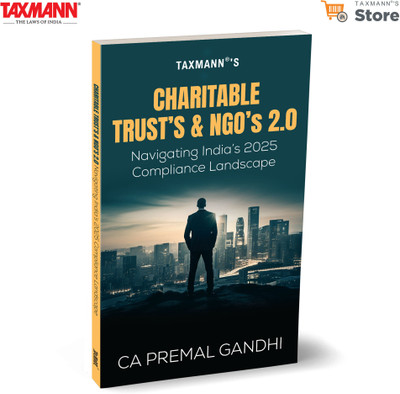Taxmann's Charitable Trusts & NGOs 2.0ŌĆöNavigating India's 2025 Compliance Landscape ŌĆō Simplifies Compliance | Governance | Tax Obligations for India's Not-for-profit Sector(Paperback, CA Premal Gandhi)
Quick Overview
Product Price Comparison
Charitable Trusts & NGOs 2.0ŌĆöNavigating India's 2025 Compliance Landscape is an authoritative, practice-oriented guide tailored for India's not-for-profit sector amidst sweeping changes in law and regulation. This 2025 Edition demystifies the evolving compliance requirements under the Income-tax Act 1961 and the Income-Tax Bill 2025. The book provides a practical roadmap for readers, empowering them to ensure seamless, full-spectrum compliance in a challenging regulatory environment. This book is intended for the following audience: (i) Trustees, Directors, and Administrators of charitable trusts and NGOs seeking clarity on governance, compliance, and tax matters (ii) Accountants, Legal Advisors, and Audit Professionals advising the third sector on operational and statutory obligations (iii) NGO Staff and Compliance Teams that are involved in documentation, registration, renewals, and day-to-day administration (iv) Students and Researchers in law, taxation, and non-profit management The Present Publication is the 2025 Edition, authored by CA. Premal Gandhi, with the following noteworthy features: (i) [Practical 'Desk-to-Filing' Checklist] Comprehensive, actionable lists covering all key forms, investments, activities, and documentation required throughout the year (ii) [Dos-and-Don'ts] Practical cases highlight common pitfalls, such as trusts losing exemptions due to benefit misuse or misapplication of funds (iii) [Step-by-Step Renewal Guidance] Structured procedures for registration, provisional to final status, and renewals for 5-year and 10-year terms, in line with the latest rules (iv) [Forward-looking Analysis] Detailed analysis of how the Income-Tax Bill 2025 and post-2026 regulatory landscape will impact charitable organisations (v) [User-friendly Language] Avoids technical jargon, focusing on accessibility and practical implementation (vi) [Most Recent Amendments] Incorporates all significant legislative updates, landmark court rulings, and CBDT circulars as of 2025 (vii) [Lucid Explanations] Avoids dense legal language; every provision is explained in plain English with context (viii) [Practice-driven] Developed from years of professional experience and feedback from leading practitioners and reviewers (ix) [Value-added Appendices] Ready reference for forms and compliance checklists, saving professionals valuable time The book offers a section-wise, topic-wise deep dive into all aspects of trust and NGO compliance, including: (i) Comparative Legal Analysis (a) Trusts, Societies, and Section 8 CompaniesŌĆökey differences and compliance mandates (IV) Statutory Duties, Rights & Liabilities (a) Detailed explanation of the roles of settlors, trustees, and beneficiaries (V) Books of Accounts & Documentation (a) What must be maintained under Rule 17AA, best practices for digital record-keeping, and electronic compliance (VI) Registration & Renewals (a) All you need to know about Form 10A, 10AB, timelines, documents, and processes for new, provisional, and renewal registrations (VII) Amendment of Trust Deed (a) Procedures, court precedents, and compliance requirements (VIII) Application of Income (a) How and when to apply income, capital expenditure rules, and loan repayment treatment (IX) Corpus and Inter-charity Donations (a) Eligibility, tax treatment, conditions, and reporting under the new law (X) Accumulation and Investment of Income (a) Permissible modes (Section 11(5)), statutory accumulations, and Form 9A/10 procedures (XI) Anonymous Donations (a) Taxability, exclusions, documentation, and practical examples (XII) Penal Taxation & Forfeiture of Exemption (a) Non-compliance scenarios, accreted tax, and case law (XIII) Tax on Accreted Income (a) Computation, FMV determination, and compliance post-deregistration or dissolution (XIV) CSR Expenditure (a) How to claim eligibility under Section 80G, and current jurisprudence (XV) Procedural Appendices (a) Ready-to-use specimen forms (9A, 10, 10B, 10BD, 10BE), board resolution formats, and corpus donation letters The structure of the book is as follows: (i) Part I | Foundations ŌĆō Legal framework, historical context, and comparative analysis of different NGO structures (ii) Part II | Core Operations ŌĆō Registration, amendments, and day-to-day management (iii) Part III | Income, Application, and Donations ŌĆō Exemptions, tax treatment, accumulations, and reporting (iv) Part IV | Compliance, Violations, and Enforcement ŌĆō Penal taxation, loss of exemptions, registration cancellation, and accreted income (v) Part V | Reference Appendices ŌĆō Comprehensive collection of relevant forms, checklists, and specimen documents for immediate application (vi) Each chapter is supplemented with case law, judicial interpretations, charts, and practical tips, making complex legal requirements easy to follow and implement

